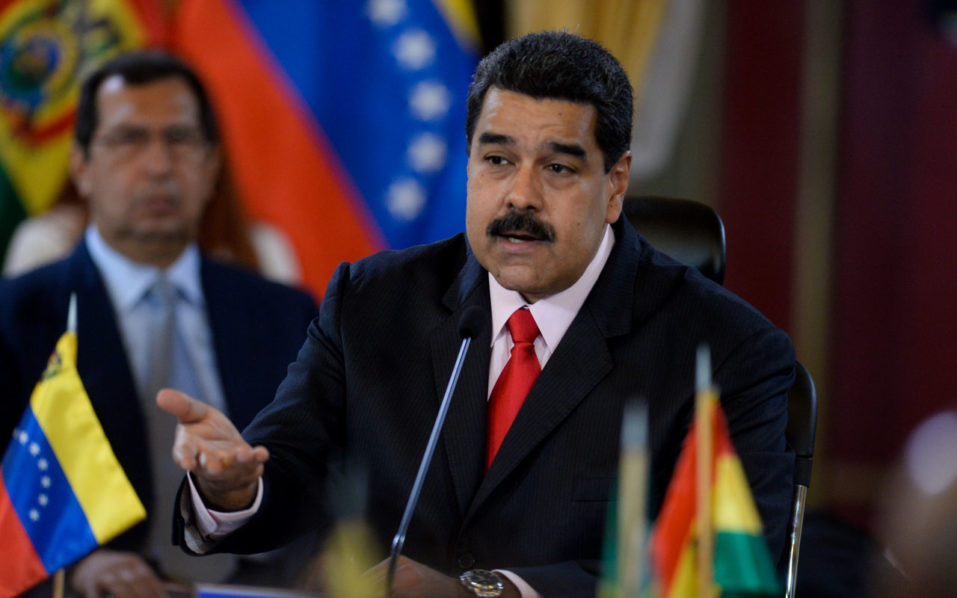 |
| (FILES) This file photo taken on March 5, 2017 shows Venezuelan President Nicolas Maduro speaking during the Bolivarian Alliance for the Peoples of Our America (ALBA) summit at the Miraflores presidential palace in Caracas. Venezuelan President Nicolas Maduro, who is accused of dismantling his nation’s democracy, will address the UN Human Rights Council in Geneva next week, a council spokesman said on September 4, 2017. / AFP PHOTO / FEDERICO PARRA |
Venezuela’s former attorney general urged the International Criminal Court on Thursday to launch an investigation into alleged abuses of murder and torture by the leaders of the crisis-hit country.
President “Nicolas Maduro and his government must pay for this, for these crimes against humanity,” said Luisa Ortega, after handing over to the tribunal in The Hague a dossier containing 1,000 pieces of evidence.
Ortega, 59, is a fugitive from Venezuela, having fled the South American country in August after a new loyalist assembly established by Maduro threw her out of office.
Standing in the rain outside the world’s only permanent war crimes court after handing her dossier to the prosecutor’s office, Ortega insisted Maduro and his government “must pay for the hunger, misery and hardship which the people of Venezuela are suffering”.
She alleged police and military officials had killed some 1,767 people in 2015. Last year there were 4,677 such deaths, she says, with 1,846 killed up to June this year.
Her dossier included witness testimony, as well as interviews with experts and doctors, detailing allegations of “murder, torture, imprisonment as well as a systematic and generalised attack on the civilian population,” she said.
Ortega said she had been collecting evidence of such crimes in her job as attorney general since 2015. She also denounced Defence Minister Vladimir Padrino Lopez, and Justice Minister Nestor Reverol among other senior officials in her deposition.
There had also been more than “17,000 arbitrary detentions and hundreds of cases of torture,” she alleged.
“We have been forced to turn to an international organisation, because there is no justice in Venezuela,” she added.
Ortega was a fierce critic of Maduro from within his regime, and has continued to make allegations against him while in exile.
The Venezuelan government has been sharply criticised amid the political and economic crisis engulfing the country with the United States and EU imposing sanctions.
Venezuela has ratified the Rome Statute underpinning the ICC, which means in theory the chief prosecutor, Fatou Bensouda, does have jurisdiction to investigate allegations of crimes against humanity there.
But since the court opened in 2002, the prosecutor’s office has received about 10,000 requests from individuals, groups or countries to investigate alleged crimes.
This year alone, activists from Mexico, and the Philippines as well as the Palestinian territories have all sought to secure or broaden ICC probes.
There are currently 10 preliminary ICC examinations and 11 full investigations under way. Most existing probes have so far focused on African nations.
AFP
President “Nicolas Maduro and his government must pay for this, for these crimes against humanity,” said Luisa Ortega, after handing over to the tribunal in The Hague a dossier containing 1,000 pieces of evidence.
Ortega, 59, is a fugitive from Venezuela, having fled the South American country in August after a new loyalist assembly established by Maduro threw her out of office.
Standing in the rain outside the world’s only permanent war crimes court after handing her dossier to the prosecutor’s office, Ortega insisted Maduro and his government “must pay for the hunger, misery and hardship which the people of Venezuela are suffering”.
She alleged police and military officials had killed some 1,767 people in 2015. Last year there were 4,677 such deaths, she says, with 1,846 killed up to June this year.
Her dossier included witness testimony, as well as interviews with experts and doctors, detailing allegations of “murder, torture, imprisonment as well as a systematic and generalised attack on the civilian population,” she said.
Ortega said she had been collecting evidence of such crimes in her job as attorney general since 2015. She also denounced Defence Minister Vladimir Padrino Lopez, and Justice Minister Nestor Reverol among other senior officials in her deposition.
There had also been more than “17,000 arbitrary detentions and hundreds of cases of torture,” she alleged.
“We have been forced to turn to an international organisation, because there is no justice in Venezuela,” she added.
Ortega was a fierce critic of Maduro from within his regime, and has continued to make allegations against him while in exile.
The Venezuelan government has been sharply criticised amid the political and economic crisis engulfing the country with the United States and EU imposing sanctions.
Venezuela has ratified the Rome Statute underpinning the ICC, which means in theory the chief prosecutor, Fatou Bensouda, does have jurisdiction to investigate allegations of crimes against humanity there.
But since the court opened in 2002, the prosecutor’s office has received about 10,000 requests from individuals, groups or countries to investigate alleged crimes.
This year alone, activists from Mexico, and the Philippines as well as the Palestinian territories have all sought to secure or broaden ICC probes.
There are currently 10 preliminary ICC examinations and 11 full investigations under way. Most existing probes have so far focused on African nations.
AFP
In this article:
